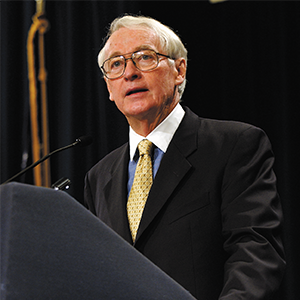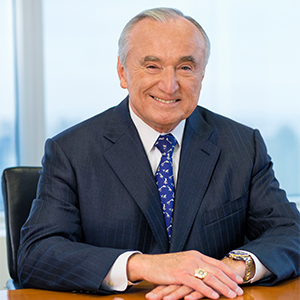James Q. Wilson Award for Public Service Dinner

Event Details
Wednesday, May 7, 2025
5:30 PM
California Club
538 Flower St, Los Angeles, CA 90071
For more information about this event, please email university.events@pepperdine.edu, or call 310.506.4448.
Join Pepperdine and the School of Public Policy for the presentation of the inaugural James Q. Wilson Award for Public Service, celebrating SPP’s service-centered mission and the ideals of the prolific political theorist, scholar, and presidential adviser whose leadership and vision were integral to the founding of SPP in the 1990s. He stayed involved with the school until the end of his life, serving as its Ronald Reagan Professor of Public Policy for 12 years.
The first recipient of the Wilson Award will be William J. Bratton, who served as chief of the Los Angeles Police Department from 2002 to 2009. Bratton’s term saw historic decreases in crime levels, much as he had accomplished in his previous role as police commissioner in New York; he is the only person to have headed the police departments of the two largest cities in the United States. He has also served as commissioner of the Boston Police Department, where he began his law enforcement career as a beat cop in 1970, and chair of the Homeland Security Advisory Council.
Presenting the award will be Rick J. Caruso, whose name adorns the Pepperdine law school where he earned a degree in 1983. A businessman, civic leader, and philanthropist who has made an indelible impact on communities throughout Southern California, Caruso’s career in public service includes a term as president of the civilian Los Angeles Board of Police Commissioners, during which he led the selection process that resulted in Bratton’s appointment as Los Angeles Chief of Police.
About the James Q. Wilson Award for Public Service
 The James Q. Wilson Award for Public Service is named for one of America’s greatest
policy scholars who had a particular influence on the creation of the School of Public
Policy.
The James Q. Wilson Award for Public Service is named for one of America’s greatest
policy scholars who had a particular influence on the creation of the School of Public
Policy.
Before there was a school, fortune brought James Q. Wilson and his wife to Malibu to live. At a crucial time, the person who would become the School's founding Dean (James R. Wilburn) met Wilson, and introduced him to Pepperdine's then-President, David Davenport. As conversations began around the creation of a School of Public Policy at Pepperdine, Wilson was integrally involved in a select committee of scholars, meeting regularly to discuss the curriculum for the new school. His legacy at the School of Public Policy – as a founder and professor here – will forever mark this institution as a unique place for the study of public policy.
Like few other social scientists of the last century, James Q. Wilson understood that beyond purely pragmatic considerations, the implementation of what could be evaluated as good public policy demanded ethical leaders who possessed a humble awareness of government's limitations. The author of such classics as The Moral Sense (1993), Moral Judgment (1997), and On Character (1997), Wilson emphasized the many human dimensions to policy development.
To this, in many of his other works – like his magisterial Bureaucracy (1989), or his American Government (last ed. 2010), American Politics: Then and Now (2012), or the edited volume, Understanding America: The Anatomy of an Exceptional Nation (2012), Wilson underlined the importance of considering America's unique historical and constitutional elements when attempting to solve public problems. On issues from crime to political engagement, Wilson combined a scientist's pursuit of tested policy with a philosopher's sense of irony.
As one of Pepperdine's School of Public Policy's founders (then becoming our first Ronald Reagan Professor of Public Policy), James Q. Wilson was essential in formulating the most unique curriculum in public policy education. We recognize his central importance to our program through our "James Q. Wilson Core," which demonstrates his wide-ranging approach to preparing public leaders for today's complex challenges.
Admission and Sponsorship Opportunities
Statesman Sponsor - $25,000
- Table of 10 at the dinner with premier seating, Dinner Program Sponsor recognition in the printed program, and 10 tickets to the sponsor reception with meet and greet with William Bratton. ($22,000 tax-deductible)
Platinum Sponsor - $10,000
- Table of 10, with premier seating, sponsorship recognition in the printed program, and two tickets to the sponsor reception with a meet and greet with William Bratton. ($6,000 tax-deductible)
Table Sponsor - $5,000
- Table of 10 at the dinner with priority seating, sponsorship recognition in printed program ($2,000 tax-deductible)
General Admission Tickets - $100
Please contact Kevin Royes (kevin.royse@pepperdine.edu) or Pete Peterson (pete.n.peterson@pepperdine.edu) to confirm your sponsorship!
Evening Schedule
- 5:30 Reception
- 6:30 Dinner
- 7:30 Scheduled Programming
Dress Code
Business casual, jackets are required for men.
The James Q. Wilson Award for Public Service Inaugural Recipient: William J. Bratton

William J. Bratton is one of the world’s most respected and trusted experts on risk and security issues. During his almost 50-year career in law, he instituted progressive change and dramatic drops in crime while leading six police departments, including seven years as Chief of the Los Angeles Police Department and two nonconsecutive terms as the Police Commissioner of the City of New York. He is the only person ever to lead the police agencies of America’s two largest cities.
As the Executive Chairman of Teneo Risk, Commissioner Bratton advises clients on risk identification, prevention, and response. Teneo Risk addresses six key areas: cyber security, infrastructure protection, counterterrorism, health advisory, internal threat mitigation and crisis management.
Prior to assuming his role at Teneo Risk, Commissioner Bratton was the 42nd police commissioner of the City of New York from January 2014 to September 2016. It was the second time he held the post. During that time, he oversaw 32 months of declining crime, including historic lows for murders and robberies. At the same time, he initiated an unprecedented Neighborhood Policing program to close the gap between the NYPD and the communities it serves. Neighborhood Policing refocused resources on the underlying issues in individual neighborhoods, connected police officers with community partners, enhanced outreach and communication strategies, and was a cornerstone of “precision policing”—the practice of identifying the few who create crime and disorder while safeguarding the many. Commissioner Bratton also spearheaded the first major technological overhaul in the NYPD in years, the Mobile Digital Initiative, which gave a smartphone with custom-designed apps to every officer and put a tablet in every patrol car. These devices put an entire precinct’s data capabilities in the palm of an officer’s hand, allowing them to read details about calls for help, research locations of interest, search names and license plates, and complete paperwork—all while remaining in the field. Additionally, the ever-changing threat picture in the world’s number one target for terrorism mandated major reforms to the NYPD’s already robust counterterrorism capabilities. In response, Commissioner Bratton developed two new units—the Critical Response Command (CRC) and the Strategic Response Group (SRG)—which now provide the city with more than 1,000 highly trained and properly equipped officers who are dedicated to counterterrorism, large-scale mobilizations, site security, and rapid deployment citywide.
A U.S. Army veteran of the Vietnam War, Commissioner Bratton began his career in 1970 as a beat cop in the Boston Police Department. In 1976 he was awarded the department’s highest citation for valor— The Schroeder Brothers Memorial Medal—for facing down a bank robber and rescuing a hostage. By 1980 he had risen to Superintendent of Police, the BPD’s highest sworn position.
In the 1990s, Commissioner Bratton established an international reputation for re-engineering police departments and fighting crime. As Chief of the New York City Transit Police, Boston Police Commissioner, and in his first term as New York City Police Commissioner, he revitalized morale and cut crime in all three posts, achieving the largest crime declines in New York City’s history. At the NYPD in 1994 and 1995, he led the development of CompStat, the internationally acclaimed command accountability system now in use by police departments nationwide. CompStat employs accurate, real-time intelligence, rapid deployment of resources, relentless follow-up, and accountability systems to focus the work of police on stopping crimes before they happen. As Los Angeles Police Chief from 2002 to 2009, in a city known for its racial tensions, entrenched gang culture and youth violence, he brought crime to historically low levels, greatly improved race relations, and reached out to young people with a range of innovative police programs. At the LAPD he also led the creation of its Real Time and Predictive Policing initiatives, while successfully implementing the country’s largest federal consent decree.
The recipient of many honors throughout his career, Mr. Bratton was named by Security magazine as one of 2010’s most influential people in the security industry based on his leadership qualities and the positive impact that his work has made on organizations, colleagues, and the general public. This was the second time in two years that he has appeared on the magazine's list of most influential security executives. In 2007 he received Governing Magazine’s “Public Official of the Year Award.” In January 1996 he appeared on the cover of Time Magazine and was featured in the article “Finally, We’re Winning the War Against Crime.” And in 2009, for his collaborative efforts in working with U.S. and British police forces, he was recognized by Her Majesty Queen Elizabeth II with the honorary title Commander of the Most Excellent Order of the British Empire (CBE).
A noted author, commentator, and consultant, Police Commissioner Bratton holds a bachelor’s degree from Boston State College (now the University of Massachusetts Boston) and is a graduate of the FBI National Executive Institute. At Harvard University’s Kennedy School of Government, he was a Senior Executive Fellow in Criminal Justice and a member of the school’s National Executive Session on Policing.
He has twice served as President of the Police Executive Research Forum (PERF) and in 2009 served as President of the Major Cities Chiefs Association. Commissioner Bratton formerly served as the Co-Chair for the Secretary of Homeland Security’s Advisory Council.
His critically acclaimed autobiography Turnaround, with Peter Knobler, was published by Random House in 1998. In 2012, Mr. Bratton and Zachary Tumin, a senior researcher at Harvard’s John F. Kennedy School of Government, co- authored a management leadership book, Collaborate or Perish. In 2021 he released his third book with Peter Knobler: The Profession, memoir of a 50-year career, community, race, and the arc of Policing in America
The James Q. Wilson Award for Public Service Inaugural Presenter: Rick J. Caruso

A renowned business innovator, dedicated civic leader and actively-involved philanthropist, Rick J. Caruso is the founder and Executive Chairman of Caruso®, one of the largest and most admired privately held real estate companies in the United States.
Under Caruso’s leadership, the company has achieved a compounded annual growth rate of nearly 20% since its inception. Its world-class portfolio continues to expand and includes the most internationally renowned and award-winning retail, residential, mixed-use properties and his newest addition, a Forbes 5 Star resort hotel destination, Rosewood Miramar Beach in Montecito, California. As cited by Green Street Advisors, Caruso properties consistently outperform traditional shopping destinations based on productivity and sales per square foot, with results three times higher than the industry average. Its flagship property, The Grove was ranked #2 on Fortune’s list of the 10 highest sales-generating shopping centers in the country.
Caruso started his career as a real-estate lawyer in the corporate finance department of one of the nation’s largest law firms. Thereafter, he transitioned from law to pursue his lifelong passion for development, establishing Caruso Affiliated Holdings in 1987. Ignoring the traditional “shopping mall” approach to retail, he adopted a fresh, new strategy for development and revolutionized the industry with imaginative retail and mixed-use destinations that serve as timeless and beloved centers of town.
At the heart of Caruso’s award-winning development approach is a deep respect and understanding of civic responsibility and a fierce loyalty to surrounding communities— the result of decades of hands-on experience in public service. Early in his career, he served as the youngest Commissioner in the city’s history when Mayor Tom Bradley appointed him Commissioner for the L.A. Department of Water and Power. In that role, he brought a 25- year-old lawsuit to resolution that provided more clean water to Los Angeles while protecting the environment. Following this success, Caruso was selected as President of the L.A. Police Commission where he led the effort to overhaul the Los Angeles Police Department and recruited William Bratton as Chief of Police. Together, they reduced the city’s crime rate to the lowest levels in 50 years.
Caruso’s deeply held personal philosophy and commitment to giving back have further solidified his reputation as a compassionate member of the community. In 1991, he and his wife Tina, founded the Caruso Family Foundation, dedicated to supporting organizations that improve the lives of at-risk children in need of healthcare and education. Among the many nonprofit organizations that he supports, Caruso is actively involved with Operation Progress, Para Los Niños, St. Lawrence of Brindisi School and Verbum Dei High School, all focused on the historically underserved area of Watts, Los Angeles.
In 2019, Caruso announced a $50 million commitment to the Pepperdine School of Law, which has been renamed the Rick J. Caruso School of Law in recognition of the historic gift. The contribution, made through the Caruso Family Foundation, will expand educational access to exceptional, historically underserved student populations—a hallmark of the Caruso family’s philanthropic efforts in the Los Angeles area and beyond—as well as fuel several initiatives to strengthen the School of Law’s academic programming.
Caruso, a long-serving member of the USC community, also endowed the USC Caruso Department of Otolaryngology at the Keck School of Medicine and the USC Catholic Center, which provides spiritual connection for faculty and students of all faiths. He earned a Bachelor of Science degree with honors from the University of Southern California Marshall School of Business and a Juris Doctorate as a Margaret Martin Block Scholar from Pepperdine School of Law.
Caruso, who was named a “retail mastermind” by The Wall Street Journal, has received numerous awards and distinctions for both his professional and philanthropic work, including "Developer of the Year" and “2016 L.A. Icon” by the Los Angeles Business Journal. Additionally, he was honored with the "True Blue" award from the Los Angeles Police Foundation, recognizing him as a leader dedicated to positive change through philanthropic, business and civic leadership. He was also honored by Pope Francis with the rank of Commander in the Order of St. Gregory the Great for his service and generosity to so many in need. In 2017, Caruso was presented the Asa V. Call Award, the most distinguished alumni honor at USC. Recently, he was named by Town and Country magazine as one of the top 50 philanthropists in the nation.
In 2018, Caruso was asked to serve as Chair of the University Southern California’s (USC’s) Board of Trustees. As Chair, he oversaw transformational reforms to the university’s culture and the Board’s governance model to ensure accountability and oversight. He has worked tirelessly to restore trust and to build a world-class leadership team, including hiring the first female president in the university’s history and playing a key role in the overhaul of the university’s athletics program.
Caruso served as the Chair of the Board of Loyola High School, and is on the Boards for St. John’s Hospital, and the Ronald Reagan Presidential Library Foundation. In April of 2020, at the height of the COVID-19 pandemic, Caruso became part of both a federal and state level task force, providing expertise on reopening the economy safely.
In the aftermath of the devastating wildfires in Los Angeles in early 2025, he and Tina gave a $5 million lead gift to raise $20 million for critical resources for Los Angeles Fire Department. This $20 million goal was met in 6 days. Following this, Caruso founded and launched Steadfast LA, a civic nonprofit organization dedicated to accelerating the rebuilding of Los Angeles.